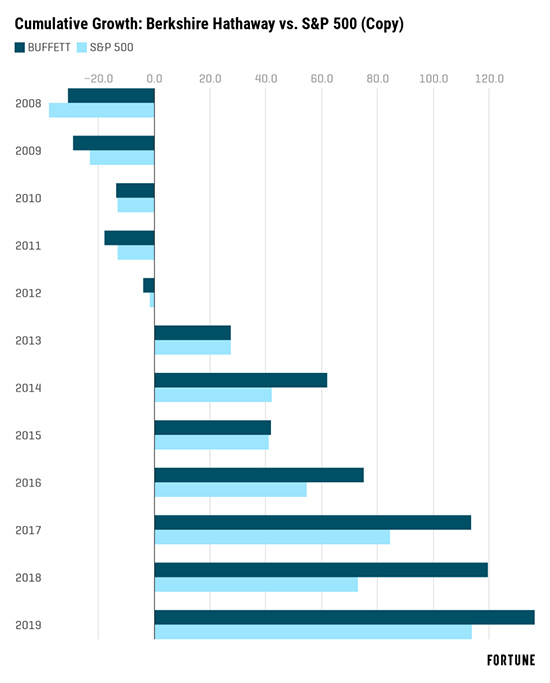股神今年战绩欠佳,大幅跑输标普500指数
|
实际情况表明,以往的表现无法保证今后的业绩。多年来一直在用伯克希尔-哈撒韦的表现和标普500指数进行比较的沃伦·巴菲特确实看到了这一点。 截至11月14日,伯克希尔-哈撒韦的股价在2019年上涨了8.3%。听起来很不错,但要知道,标普500指数的涨幅达到了23%。 长期以来,巴菲特一直将标普500指数作为自己以及合伙人查理·芒格的工作成绩比较基准。2019年2月,巴菲特给股东的最新年度信件的开头就是1965年以来伯克希尔-哈撒韦和标普500指数的比较表。 但目前的落后并不意味着“奥马哈先知”失去了魔力。《财富》杂志对2008年1月2日以来的表现进行了分析,结果发现就长期而言,巴菲特处于领先位置。 标普500障碍 衡量任何投资策略的实力都需要一个基准,而标普500指数可以充当这样的角色。一项覆盖2016年之前15年的研究发现,标普500指数跑赢了绝大多数的基金,包括92%的大盘股基金、89.3%的中盘股基金和85.5%的小盘股基金。 所谓的被动型基金在2019年9月跨越了一个里程碑——投资者对美国指数基金和ETF的投资首次超过了主动管理型共同基金。 大多数人可能都无法跑赢大盘。但在财务方面有远大目标的人会去尝试。巴菲特和他的公司经常取得胜利,他们把标普指数作为自身策略的试金石。 大衰退以来巴菲特和标普500指数的比较 我们没有回到1965年,相反,我们比较的阶段是2008年,也就是从大衰退全面爆发到2018年。 在此期间,伯克希尔-哈撒韦在八个年头里领先于标普指数,几乎占全部时间的73%。 《财富》杂志还分析了每年截至11月14日二者的表现(如果当天是周末,就将截止日期定在接下来的一个开盘日)。从2008年到2018年,巴菲特截至11月14日的表现落后于标普500指数,但在年底反败为胜的只有一年,具体来说是2017年。 五个因素压低了伯克希尔2019年的表现 如下图所示,虽然巴菲特在2019年表现良好,但标普500指数截至11月中期的走势可谓精彩。 |
Past performance, it turns out, is no guarantee of future results. After years of comparing the performance of his Berkshire Hathaway to the S&P 500, Warren Buffett is seeing exactly that. As of November 14, Berkshire Hathaway shares were up 8.3% year to date. Sounds pretty good—till you calculate the S&P 500 was up 23%. Buffett has long used the S&P 500 as a benchmark for his efforts and those of his partner Charlie Munger. Buffett’s latest annual letter to shareholders, which came out in February 2019, starts with a comparative table of Berkshire Hathaway and S&P 500 performance since 1965. But a current rout doesn’t mean the “Oracle of Omaha” has lost his touch. A Fortune analysis of performance since Jan. 2, 2008 found Buffett stays ahead in the long run. Plus, in the back-and-forth of who’s on top, investors can learn some important lessons. The S&P 500 hurdle Measuring the strength of any investment strategy needs a benchmark, and the S&P 500 index can be a taskmaster. One study looked at a 15-year period ending with 2016 and found the S&P 500 beat the bulk of funds: 92% of large-cap funds, 89.3% of mid-caps, and 85.5% of small-cap. So-called passive funds passed a milestone in September 2019. For the first time, investors had more money in U.S. index funds and ETFs than actively managed mutual funds. Most people probably can’t beat the market. But the fiscally ambitious try. Buffett and company often succeed, using the S&P as a touchstone to test their strategies. Buffett vs. S&P 500 since the Great Recession Instead of going back to 1965, consider the performance from 2008—the full start of the Great Recession—through 2018. During this period, Berkshire Hathaway outperformed the S&P index in eight years, or almost 73% of the time. Fortune also analyzed the performance of both through Nov. 14 of each year. (When the date fell on a weekend, Fortune chose the next weekday the markets were open.) From 2008 through 2018, there was only one year, in 2017, when Buffett trailed the S&P 500 on Nov. 14 but was able to outdo the index by year’s end. 5 factors weighed on Berkshire’s 2019 performance As the chart below shows, while Buffett has had a good 2019, the S&P 500 has had a great year through mid-November. |

|
造成二者表现差异的因素有几个: 看重现金 Spark Asset Management的总裁兼首席投资官蒂姆·贝恩说:“巴菲特手中保留了大量现金,有近1300亿美元,[大约]占伯克希尔-哈撒韦总市值的四分之一。”现金的增值速度没有股票那么快,但这不会吓退巴菲特,他会留着现金,而不是用他认为不明智的方法把这些钱投出去。 讨厌科技 Babylon Wealth Management的创始人斯托扬·帕纳依奥托夫说:“伯克希尔在投资科技和高增长公司方面一直很保守,而过去10年,超低的利率一直在推动股市上行。” 一笔坏账 然后是卡夫亨氏。这是伯克希尔-哈撒韦最大的持股之一。Integrity Advisory的首席投资官马特·阿伦斯说:“今年2月,这部分股票的价值蒸发了25%。” 金融股走势落后 克瑞顿大学海德商学院(Heider College of Business of Creighton University)的金融学教授罗伯特·约翰逊35年来一直是伯克希尔的股东。他说:“巴菲特仓位最集中的领域之一就是金融板块,包括大型银行和保险公司,而直到最近,此类股票一直不受人们青睐。”这拖累了巴菲特的业绩。他在这个板块中的许多持仓“都以比市价低几乎50%的水平卖掉了。” 账面价值 第五个因素较为复杂,那就是长期以来巴菲特一直都注重伯克希尔的账面价值。这是公司价值的底线,也就是资产减去负债。由于利率低,对希望实现增长的投资者来说按账目价值计算出的资产价值增长的不够快。因此,人们已经不关注账面价值了,而且投资者也不想以那样的高价买进伯克希尔的股票。Smead Capital Management的研究主管兼证券投资经理托尼·谢勒指出,伯克希尔对账面价值的依赖以及投资者越发不看重这个指标是标普500指数跑赢伯克希尔股价的一个重要原因。 不过,2019年只是短短的一年,观察这么短的一段时间是一种误导行为。最终的问题还会归结为长期来看谁表现的更好。下图展示了从2008年1月2日到某一年年底(2019年是截至11月中旬)的累计涨幅,或者说,是2008年到某一年的所有涨跌的总和。 |
Several factors are contributing to the gap in performance: Focus on cash “Buffett maintains a huge cash position—nearly $130 billion—which represents [roughly] a quarter of the entire market cap of Berkshire Hathaway,” says Tim Bain, president and chief investment officer at Spark Asset Management. Cash isn’t appreciating in value as fast as stocks, but that doesn’t deter Buffett, who will leave it parked rather than invest it in a way he deems unwise. Distaste for tech “Berkshire has been slow in investing in tech, and high growth companies as the investors’ appetite for risk and ultra-low interest rates have pushed the markets up in the last decade,” says Stoyan Panayotov, founder of Babylon Wealth Management. One bad bet Then there’s Kraft Heinz. It is one of Berkshire Hathaway’s largest holdings, and it “lost 25% of its value in February,” says Matt Ahrens, chief investment officer at Integrity Advisory. Lagging financials “One of his largest concentrations is in the financial sector—largely banks and insurance companies—and, until recently, those sectors have been out of favor,” says Robert Johnson, professor of finance at Heider College of Business of Creighton University and a 35-year-long Berkshire shareholder. That slowed performance. Many of Buffett’s holdings in this sector “are selling at a discount of almost 50% to the market.” Book value The fifth, and more complicated, factor is Buffett’s long-held emphasis on Berkshire’s book value—the bottom-line worth of the company, determined by subtracting liabilities from assets. With low interest rates, the asset values as calculated by book value don’t grow quickly enough for investors, who want growth. Book value has fallen out of favor, as a result, and investors don’t want to pay as much for Berkshire shares. Berkshire’s reliance on book value—and investors cooling on the metric—is a big reason the S&P 500 has grown faster than Berkshire shares, notes Tony Sherrer, director of research and portfolio manager at Smead Capital Management. Still, 2019 is only one year and looking at such a short period is an act of misdirection. The question ultimately comes down to who does better in the long run. Here is another chart that shows cumulative multi-year growth from Jan. 2, 2018 through the end of each year (for 2019, it’s through mid-November)—in other words, the collection of all the gains and losses between 2008 and a given year. |

|
尽管有些年份出现了下跌,但伯克希尔-哈撒韦的长期表现远远好于标普500指数。从2008年到2018年,这家公司的累计涨幅为119.7%,而标普500指数为73.2%。算上今年年初以来标普指数的强劲走势,2008年至今该指数上涨了114%,而伯克希尔的涨幅为136.4%。 而且,聪明的资金已经知道永远也不要把巴菲特排除在外。 约翰逊说:“在1999年《巴伦》周刊(Barron’s)的最后一期中,安德鲁·巴里写的封面文章题目是‘怎么回事沃伦?’这篇文章认为巴菲特对科技股缺乏经验,从而导致了他的失败。我们都知道后来的情况——互联网泡沫破裂,伯克希尔则处于很好的位置。” 对约翰逊来说,底线就是不要和奥马哈先知对着干。(财富中文网) 译者:Charlie 审校:夏林 |
Even with some down years, Berkshire Hathaway shares have seen significantly greater growth in the long run than the S&P 500. From 2008 through 2018, the company saw cumulative growth of 119.7%, versus 73.2% for the S&P 500. And even with the boost the S&P has seen so far this year, the growth from 2008 through mid-November of 2019 is 114%. For Berkshire, it’s 136.4%. And, the smart money has learned never to count Buffett out. “In the last Barron’s issue in 1999, Andrew Bary wrote a cover story entitled ‘What’s Wrong Warren?’” Johnson says. “The article contended that Buffett’s lack of expertise in technology stocks was leading to his demise. We all know what happened: The dot com bubble burst and Berkshire was well positioned.” The bottom line, according to Johnson? Don’t bet against the Oracle of Omaha. |













